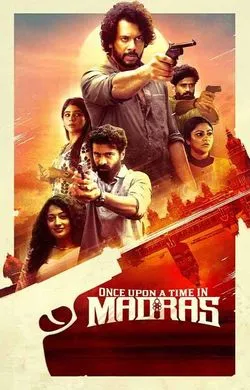Movie Review : Once Upon A Time In Madras: Where Desperation Meets Destiny, One Trigger at a Time.
Once Upon A Time In Madras takes you on a riveting journey through the lives of four individuals whose fates are sealed by a single gun — not a weapon of choice, but a tool of desperation, confusion, and moral ambiguity. The film stands apart with its creative narrative style, as it weaves a domino effect of events set into motion by a single murder weapon, all connected by chance, choice, and the hidden corners of human nature.
At its core, the film explores the chaos and emotional turmoil behind desperate actions. The narrative jumps between four distinct yet intertwined stories, each with its own set of motivations and moral dilemmas. There’s Madhi (Anjali Nair), a housewife who slowly uncovers the treachery of her husband and in-laws, leading to a confrontation with her own reality. Savitri (Abhirami), an unwavering mother, fights to protect her trans daughter Karthi from the clutches of a loan shark, while Raja (Bharath) finds himself lured into an assassination job to pay for his wife’s life-saving treatment. Meanwhile, Thalaivasal Vijay portrays a father, consumed by caste-driven beliefs, whose misunderstanding spirals into violence.
The film’s most compelling strength is its creative narrative, which shifts focus fluidly between these characters. It’s a unique experiment, stepping away from traditional whodunit tropes to ask: why does a person commit murder? The gun, more than just a tool of violence, becomes a metaphor for the consequences of these individuals’ desperation. The film doesn’t rush to unravel its mysteries but instead unravels the motivations behind each character’s decisions, keeping the audience intrigued with its slow-burn suspense.
The emotional depth of the film is equally profound. Abhirami’s portrayal of Savitri, the protective mother, brings an authenticity and rawness that makes her character unforgettable. Her moving dialogue to her daughter about the power of education, despite the suffering she endures, is a standout moment of natural warmth and wisdom. Anjali Nair’s performance as a woman gradually coming to terms with her trapped existence is quiet yet powerful, bringing to life the internal conflict of a character caught between societal expectations and personal freedom.
Even though the movie’s nonlinear structure can feel a bit jerky at times, it keeps the viewer engaged by constantly shifting the lens from one character’s turmoil to another. The suspense lies not in the mystery of the gun’s trajectory but in understanding the emotional and moral journey that each of the characters undergoes.
Visually, the film is striking. The creative shots—like the politician’s eyes burning with fire or the haunting green glow around Shiva’s character—add an artistic layer to the storytelling, drawing you into the world of Madras, where every shadow and glance seems to hold a secret. These moments of visual flair, though occasionally indulgent, reinforce the sense of a world on the edge of unraveling, where nothing is as it seems.
The performances are uniformly strong. Bharath excels in playing the disheveled, desperate man willing to sacrifice everything, while Thalaivasal Vijay, with his boisterous energy, creates a character who is both deeply flawed and fiercely human. The supporting cast adds to the richness of the story, making it feel like a collaborative effort rather than a series of individual tales.
While the film could have benefited from a more seamless progression between its four narratives, its strength lies in the emotional truth at its heart. It’s a story about people pushed to the brink, making choices that lead to irreversible consequences. The film’s refusal to overreach, focusing instead on the intimate emotional stakes of its characters, makes it a tightly controlled and satisfying experience.
Once Upon A Time In Madras may not reinvent the crime drama, but it brings a fresh and creative perspective on how violence and desperation intersect in the human experience. With its strong performances, inventive narration, and insightful exploration of human flaws, it’s a film that resonates long after the credits roll—a solid, thought-provoking watch that offers a unique flavor of crime drama.

Related Article
Kadhalikka Neramillai Movie Review : Ravi and Nithya Menen’s updated OK Kanmani romance is bold & breezy
Madha Gaja Raja Movie Review : A self-aware, largely entertaining throwback
Game Changer Movie Review : Ram Charan and Shankar deliver a grand political drama
Write a comment Cancel reply
You must be logged in to post a comment.
